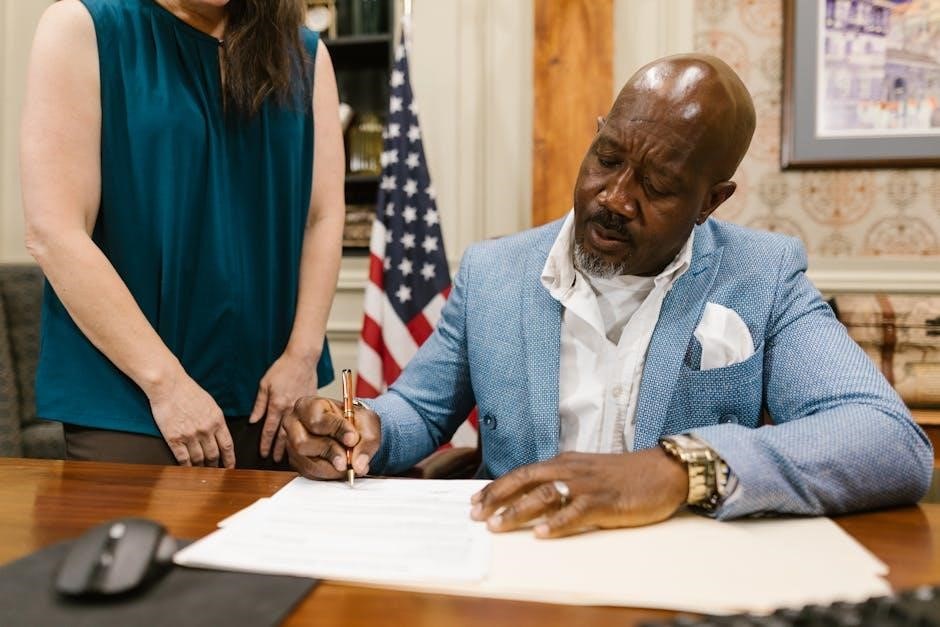Understanding Divorce Papers in Colorado
Divorce papers in Colorado are essential legal documents outlining the dissolution process. Key forms include JDF 1011 (Petition for Dissolution) and JDF 1116 (Final Divorce Decree), available in PDF format. These documents ensure legal accuracy and compliance with state requirements.
1.1 Overview of Divorce in Colorado
In Colorado, divorce is a legal process that dissolves a marriage, allowing both parties to move forward independently. The state follows a no-fault divorce system, meaning neither party needs to prove blame. To file, at least one spouse must have lived in Colorado for 182 days. The process involves submitting official forms, such as the JDF 1011 (Petition for Dissolution of Marriage), and completing legal steps like mediation and court hearings. The final divorce decree (JDF 1116) officially ends the marriage. Colorado courts ensure fairness in property division, child custody, and support arrangements, making the process structured yet adaptable to individual circumstances.
1.2 Importance of Using Official Forms
Using official Colorado divorce forms is crucial for ensuring legal compliance and avoiding delays. These forms, such as JDF 1011 and JDF 1116, are designed to meet state-specific requirements and provide clear guidance. Failing to use official forms can result in rejected filings or legal complications. Official forms are regularly updated to reflect changes in laws and procedures, ensuring accuracy. They are available in PDF and Word formats, making them accessible for download and completion. By using these forms, individuals can maintain professionalism and clarity in their submissions, which are essential for court proceedings. Official forms also help ensure that all necessary information is included, preventing potential legal issues.
1.3 Role of PDF Formats in Legal Documentation
PDF formats play a vital role in legal documentation for Colorado divorces due to their reliability and consistency. Official forms like JDF 1011 and JDF 1116 are provided in PDF to ensure they cannot be altered, maintaining their integrity. This format prevents unauthorized edits, which could compromise legal validity. PDFs also preserve the layout and formatting, ensuring documents appear professional and readable when submitted to courts. Additionally, PDFs are universally compatible across devices and software, making them accessible for parties involved. Their security features, such as password protection, further safeguard sensitive information. This makes PDF the preferred format for legal submissions in Colorado divorce proceedings, ensuring accuracy and compliance with court standards.

Types of Divorce Forms in Colorado
Colorado divorce forms include JDF 1011 (Petition for Dissolution), JDF 1101 (Legal Separation), JDF 1116 (Final Decree), and JDF 79 and JDF 80 (subpoena-related forms), ensuring legal accuracy.
2.1 JDF 1011 ― Petition for Dissolution of Marriage
JDF 1011 initiates divorce proceedings in Colorado. It collects essential details about the marriage, children, property, and debts. Proper completion ensures legal compliance and avoids delays. Available in PDF, this form is crucial for starting the dissolution process. Ensure all information is accurate and complete before submission to the District Court. This form is the foundation of the divorce process, outlining the grounds for dissolution and the parties’ agreements or disputes.
2.2 JDF 1101 ー Petition for Legal Separation
JDF 1101 is used for legal separation, an alternative to divorce. It outlines the separation terms, similar to divorce but without ending the marriage. Available in PDF, this form includes details like property division and spousal support. It must be filed with the District Court and is suitable for couples who wish to remain married but live separately. Legal separation maintains legal ties while addressing financial and personal matters. This form ensures clarity and agreement between both parties.
2.3 JDF 1116 ー Final Divorce Decree

JDF 1116 is the final document declaring the legal end of a marriage. It is issued after court approval, confirming all agreements and terms are finalized. Available in PDF and Word formats, this form ensures the dissolution is legally recognized. It outlines property division, custody arrangements, and spousal support. Both parties must receive a copy for their records. This decree is essential for legally ending the marriage and moving forward independently. It is typically filed after mediation and court proceedings are completed. The final decree is a critical step in the divorce process.
2.4 JDF 79 ー How to Issue a Subpoena
JDF 79 provides step-by-step guidance on issuing a subpoena in Colorado divorce proceedings. This form is essential for compelling witnesses or documents in court. Available in PDF and Word formats, it outlines legal requirements and procedures. Properly issuing a subpoena ensures evidence is presented fairly. The form must be completed accurately and served according to Colorado court rules. Failure to comply may result in evidence being excluded. This document is crucial for ensuring legal proceedings are conducted smoothly and justly. It is often used alongside JDF 80, the District Court Subpoena form, to complete the process effectively.
2.5 JDF 80 ー District Court Subpoena
JDF 80 is the official District Court Subpoena form used in Colorado divorce cases. It is available for download in PDF and Word formats. This form is essential for compelling attendance of witnesses or production of documents during legal proceedings. Proper completion and service are critical, as failure to comply may result in evidence exclusion. The subpoena must be issued by the court clerk, served to the recipient, and returned as proof of service. It is often used in conjunction with JDF 79, which provides instructions on issuing subpoenas. This form ensures that all legal requirements are met, facilitating a smooth court process and fair resolution of divorce matters.

Filing Divorce Papers in Colorado
Filing divorce papers in Colorado involves submitting official forms to the court. Ensure residency requirements are met, complete necessary documents, and pay filing fees. Online filing is an option for convenience and efficiency, allowing parties to process their case remotely.
3.1 Residency Requirements for Filing
In Colorado, to file for divorce, at least one spouse must have been a resident of the state for at least 182 days prior to filing the petition. This residency requirement ensures jurisdiction for the court to handle the case. Additionally, if the couple has children, the children must have lived in Colorado for at least 182 days unless they are under six months old. The residency requirement is a critical step in the legal process, as it establishes the court’s authority to grant the dissolution of marriage. The petition must be filed in the county where one of the spouses resides.
3.2 Steps to File Divorce Papers
Filing divorce papers in Colorado involves several structured steps. First, obtain the necessary forms, such as the JDF 1011 Petition for Dissolution of Marriage, from the Colorado courts website. Ensure all forms are completed accurately, providing detailed information about marital assets, debts, and child custody if applicable. Once completed, file the documents with the district court in the appropriate county. Pay the required filing fee or request a waiver if eligible. Serve the papers to your spouse via certified mail or a process server. Finally, attend any scheduled court hearings and follow the court’s instructions to finalize the process. Properly submitting and serving the papers is essential for a smooth legal proceeding.
3.3 Filing Fees and Costs
Filing divorce papers in Colorado involves specific costs. The standard filing fee for a divorce petition is approximately $230, though this may vary slightly by county. Additional costs may include fees for issuing subpoenas or serving papers to your spouse. If you cannot afford these fees, you may apply for a fee waiver by completing the appropriate form. Payment can typically be made via cash, check, or credit card, depending on the court’s policies. These costs are mandatory to initiate the legal process, ensuring your case is officially recognized and processed by the court system. Planning for these expenses is crucial to avoid delays in your divorce proceedings.
3.4 How to File Divorce Papers Online
Filing divorce papers online in Colorado is a convenient option for many. Visit the official Colorado Judicial Department website to access the electronic filing system. Create an account to submit your completed PDF forms, such as JDF 1011 and JDF 1116. Ensure all documents are filled out accurately and saved in the correct format. After uploading, pay the required filing fee using a credit or debit card. Once submitted, you’ll receive a confirmation. This method eliminates the need to print and physically deliver papers, streamlining the process. Online filing is efficient and reduces delays, making it a popular choice for those handling their own divorce proceedings.

Legal Requirements and Procedures
Colorado requires residency and compliance with legal procedures for divorce. The process involves mandatory waiting periods, mediation, and court hearings to ensure fair resolutions and adherence to state laws.
4.1 Mandatory Waiting Period
A mandatory waiting period of 91 days is required in Colorado for divorce proceedings. This period begins when the Petition for Dissolution of Marriage is filed and ends with the issuance of the Final Divorce Decree. Although the process cannot be finalized sooner, parties may negotiate and settle during this time. Colorado also requires at least 182 days of residency before filing. This waiting period ensures both parties have time to reconsider and allows for legal steps like mediation or property division. Exceptions may apply if both parties agree to a shorter timeline or in cases of default judgments. This ensures fairness and legal compliance.

4.2 Mediation Requirements
In Colorado, mediation is often required in divorce cases, particularly when disputes involve child custody, property division, or spousal support. The court may order mediation to help parties reach a mutually acceptable agreement. Mediation is a confidential process where a neutral third party facilitates discussions. Attendance is mandatory unless waived by the court. The goal is to resolve conflicts without a trial, saving time and emotional stress. Failure to comply may delay the proceedings. A Certification of Mediation Compliance (JDF 1337) must be filed to confirm participation. Mediation promotes amicable resolutions, ensuring both parties’ interests are considered fairly.
4.3 Court Procedures and Hearings
Court procedures in Colorado divorce cases involve specific steps to ensure fairness and legality. After filing divorce papers, the petitioner must serve the respondent, who then has 21 days to respond. If uncontested, the case may proceed without a hearing. For contested cases, the court may schedule a trial to resolve disputes. Hearings are conducted to address evidence, testimony, and arguments from both parties. The court reviews all submissions, including the Final Divorce Decree (JDF 1116), to ensure agreements are equitable. Proper preparation and adherence to Colorado’s legal standards are crucial for a smooth process.
4;4 Role of the District Court
The District Court in Colorado plays a central role in divorce proceedings, ensuring all legal requirements are met. It reviews divorce papers, including the Petition for Dissolution of Marriage (JDF 1011) and Final Divorce Decree (JDF 1116), to verify accuracy. The court adjudicates disputed issues like property division, child custody, and support. It also ensures compliance with residency requirements and proper service of documents. Judges may conduct hearings to resolve disputes and grant final decrees. The District Court’s oversight guarantees the process is fair, lawful, and aligned with Colorado statutes, providing a formal conclusion to the marriage.

Completing the Forms
Completing Colorado divorce forms requires accuracy and attention to detail. Ensure all fields are filled correctly, as errors can delay processing. Forms like JDF 1011 must be signed and notarized. Proper formatting in PDF or Word is essential for court acceptance. Verify all information aligns with legal standards before submission to avoid discrepancies. Consulting legal resources or professionals can help ensure compliance and accuracy.
5.1 Filling Out JDF 1011 Correctly
Filling out JDF 1011 (Petition for Dissolution of Marriage) requires precise and accurate information. This form initiates the divorce process in Colorado, so errors can delay proceedings. Ensure all personal details, such as names, addresses, and marriage dates, are correct. Specify the grounds for divorce and list marital assets, debts, and property. Include information about children, if applicable, and indicate your preferences for custody, support, and division of property. Use the official PDF version from the Colorado courts website to maintain formatting and compliance. Double-check all entries before signing and notarizing. Accuracy ensures the court processes your petition efficiently and smoothly.
5.2 Ensuring Accuracy in Legal Documentation
Accuracy in legal documentation is critical to avoid delays or legal complications. Colorado divorce forms, such as JDF 1011 and JDF 1116, require precise information. Review all details, including personal data, asset lists, and custody arrangements. Use official PDF forms from the Colorado courts website to ensure compliance. Double-check calculations for property division and support. Any errors can result in rejected filings or court-ordered corrections. Consider consulting legal aid or an attorney for complex cases. Ensure all signatures are notarized and submitted to the appropriate court. Accuracy protects your rights and ensures the divorce process proceeds smoothly.
5.3 Signatures and Notarization Requirements
Signatures and notarization are essential for validating divorce documents in Colorado. All parties must sign the forms, and certain documents require notarization to ensure authenticity. For example, the JDF 1011 (Petition for Dissolution of Marriage) and JDF 1116 (Final Divorce Decree) must be signed in the presence of a notary public. This step prevents fraud and confirms voluntary agreement. Missing or improper notarization can delay the process or lead to rejection. Ensure all signatures are witnessed and notarized before submitting to the court. This step is critical for the legal validity of your divorce papers in Colorado.

Additional Resources and Support
Access Colorado Courts website for official PDF and Word divorce forms. Legal assistance and self-help guides are available for consultation and DIY divorce processes, ensuring proper documentation and compliance.
6.1 Accessing Forms on the Colorado Courts Website
The Colorado Courts website offers a comprehensive library of PDF and Word divorce forms, including JDF 1011 and JDF 1116. Users can download these forms for free, ensuring they meet legal standards. The site also provides detailed instructions for completing each document. This resource is ideal for self-representation or attorney-assisted filings. By accessing these forms, individuals can streamline the divorce process, ensuring accuracy and compliance with Colorado state law. The website is regularly updated, guaranteeing access to the most current versions of all necessary paperwork.
6.2 Legal Assistance and Consultation Options

Legal assistance is crucial for navigating Colorado divorce proceedings. Individuals can consult family law attorneys or legal aid services for guidance. The Colorado Legal Services website offers free legal advice for low-income residents. Additionally, the Colorado Bar Association provides referrals to qualified attorneys specializing in family law. Many law firms offer free initial consultations to discuss divorce strategies. Legal aid clinics across the state also provide affordable assistance. Consulting with a legal professional ensures that divorce papers are completed accurately and that rights are protected. This support is especially valuable for complex cases involving child custody, property division, or spousal support.
6.3 DIY Divorce and Self-Representation
Colorado allows individuals to handle their divorce without an attorney through DIY divorce and self-representation. The state provides official PDF forms, such as JDF 1011 and JDF 1116, which can be downloaded from the Colorado Courts website; These forms are designed to guide individuals through the process. Self-representation requires careful adherence to legal procedures and deadlines. Many courthouses offer self-help centers or online resources to assist with form completion and filing. Additionally, legal aid organizations and online platforms like Hello Divorce offer step-by-step guidance. While DIY divorce can save costs, it’s important to ensure accuracy to avoid delays or legal complications. Proper preparation is key to a smooth process.

Finalizing the Divorce
Finalizing a divorce in Colorado involves submitting the completed forms, including JDF 1116 (Final Divorce Decree), for court approval. Once approved, the decree is granted.
7.1 Submission and Approval Process
Submit the completed Final Divorce Decree (JDF 1116) and supporting documents to the Colorado District Court. The court reviews the paperwork for accuracy and compliance with state laws. If everything is in order, the judge approves the decree, finalizing the divorce. This process typically takes a few weeks, but delays may occur due to court backlog. Once approved, the decree is legally binding, and both parties are notified. Ensure all forms are filled correctly to avoid rejection. The court may request additional information or corrections before approval. Proper submission and approval are critical for the divorce to be officially recognized.
7.2 Receiving the Final Divorce Decree
Once the court approves the divorce, the Final Divorce Decree (JDF 1116) is signed by the judge and filed with the court clerk. Copies are typically mailed to both parties, finalizing the legal separation. This document officially declares the marriage dissolved and outlines the agreed-upon terms, such as property division and custody arrangements. The decree becomes legally binding upon the judge’s signature. Ensure you receive and review the document carefully, as it serves as proof of the divorce. Keep a copy for personal records and legal purposes. The process typically takes a few weeks, but timing may vary depending on court workload.
